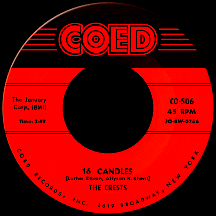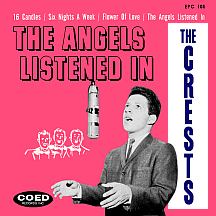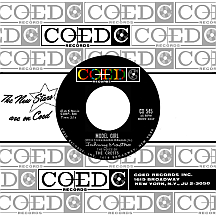THE CRESTS
More than any other place, New York City is or at least should be considered the vocal group harmony hub of rock's formative years. Other major 'burgs had similar settings unique to their own surroundings, but where else could a fan of this exciting, if somewhat controversial, new music walk a few blocks and hear so many street corner harmonizers? Where might there be a better spot for a singer to so easily bond with other likeminded musical hopefuls? Philadelphia? Maybe. But Manhattan's Lower East Side, where a person merely had to step outside to get caught up in the scene, would seem to have an edge. Five singers who became known as The Crests started there and for a little while in 1959 and '60, four of them were at the top of the vocal group game.
J.T. Carter always had a knack for harmony, often claiming he was born with the gift. While attending P.S. 160 in Brooklyn in the mid-'50s he formed a vocal quartet with fellow middle-school-aged students: Puerto Rican tenor Harold "Chico" Torres and two others who were black like himself, first tenor Talmadge "Tommie" Gough and alto/soprano contributor Patricia Vandross, all three residents of the high-rise housing project (a short walk from the East River) named after Alfred E. Smith. One spot needed filling: a lead singer. John Peter Mastrangelo lived several blocks north of the projects, on Mulberry Street in the "Little Italy" district. A fan of Alan Freed's show on WINS (and, later, WABC), he developed an interest in the kind of harmony singing hitmaking groups like The Moonglows and Flamingos were creating. In 1957 he met J.T. (who by that time had named his group The Crests) and joined as lead; the fact Johnny was white was of no concern to anyone.
Practice sessions took place at Patricia's home in the projects. They performed on the streets as often as possible and sometimes sang in the subway; one day a female rider gave them Al Browne's business card. They were familiar with the music producer through his work with The Heartbeats, who'd scored earlier in the year with "A Thousand Miles Away." Browne (the subway lady's husband, it turned out) was a pianist who'd played on "This is the Real Thing Now," a 1953 Decatur label disc by The Billy Dawn Quartet, then composed "Eternal Love" for the group when they appeared on the Herald label as The Heralds. The group's leader, Billy Dawn Smith, was a singer and songwriter (often credited as William P. Smith) who, with William Miller and Bea Caslon, co-founded Hull Records (located in N.Y.'s famous Brill Building) and used Browne's band to back the Heartbeats and others in the studio.
The young quintet gave Browne a call and he set them up with the fledgling Joyce label, where they recorded two singles penned by Mastrangelo and Browne: ballad "Sweetest One" and faster-tempoed "My Juanita." Freed started spinning both sides and a brief A side showing on the national charts in July '57 led to a second session with Browne's band for a follow-up, "No One to Love." George Paxton, a saxophonist and bandleader with a recently-founded enterprise, showed interest; Coed Records (also with an office in the Brill Building) was to become a solidly successful label over the next half-decade. Paxton signed the Crests and plans were made for them to embark on an extensive tour, but Patricia's parents didn't approve of their 15-year-old daughter going on the road, so she quit the group. The remaining members weren't much older but, well, it was different for men (or boys, even) in those days. Much later, Patricia's younger brother Luther Vandross (just seven years old in the spring of '58) became a singing sensation of the 1980s and '90s.
From the start, Paxton and his associates had an eye on establishing Mastrangelo as a solo star and even suggested an abbreviated professional name. The all-male group's debut, "Pretty Little Angel," credited to The Crests with Johnny Mastro, had a slicker production than the Joyce discs. Written by Johnny with Luther Dixon and Bert Keyes, it floundered right out of the gate.
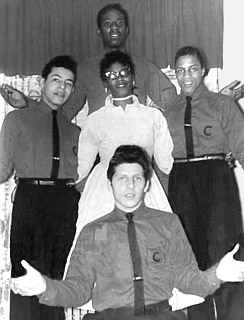
Then the breakthrough came. While the early sides focused on group harmony, "16 Candles" highlighted Johnny's lead. Luther Dixon (who'd established himself over the previous two years writing hits for the likes of Pat Boone, Perry Como and Nat "King" Cole) composed the song with newcomer Allyson R. Khent, capturing the zeitgeist of the era's youth with cleverly contrived phrases like 'You're only 16, but you're my teenage queen' and '16 candles in my heart wil glow, forever and ever for I love you so.' Released in November 1958, the single began its national climb the week of Thanksgiving, broke into the top 40 just before Christmas and moved steadily to a number two peak in February '59. "Lovin' Up a Storm" by Jerry Lee Lewis was a notable Dixon-Khent collab before he moved into a position with Scepter Records (becoming a key player in The Shirelles' success) while she continued composing songs for the Crests with various collaborators.
Freed wasted no time in booking them for his Christmas Jubilee of Stars show opening December 25th at Loew's State Theatre in Times Square, throwing them smack dab into the middle of an all-star lineup (The Everly Brothers, Jackie Wilson, Frankie Avalon and the list goes on), an abrupt transition to the big time. They also began making frequent guest appearances on both of Dick Clark's ABC-TV series, American Bandstand and The Saturday Night Beech-Nut Show. The follow-up single addressed the frustration of spending "Six Nights a Week" between Saturday dates; penned by Billy Dawn Smith and Alicia Evelyn (her prior claim-to-fame the 1955 hit "Pepper-Hot Baby"), it reached the top 30 in April. More shows and tours were booked and the Crests remained busy throughout the year. With Civil Rights still several years away from being passed into law, the racially-mixed group experienced a level of segregation they hadn't known in New York; for Johnny especially, being restricted from certain hotels or restaurants and seeing how audience members were kept separate, particularly in the southern states, was an eye-opener.
Another Evelyn-Smith effort, "Flower of Love," was perhaps too similar to its forerunner to elicit as much interest and made only a brief chart appearance. The Crests rebounded into the top 30 in October with "The Angels Listened In," a welcome mid-tempo number. As the touring merry-go-round continued, their repertoire expanded with the Khent-Smith tune "A Year Ago Tonight," followed by "Step By Step," an April-May 1960 top 20 entry written by Smith and proven hitmaker Ollie Jones (known for Nat Cole's "Send For Me" and Fabian's "Tiger"). Paxton, meanwhile, retained the opinion that solo stardom for Johnny was the better long-term plan. A version of Irving Berlin's often-remade "Say it Isn't So" was credited to Johnny Masters, its failure compensated for by another Khent-Smith song, "Trouble in Paradise," one of the quartet's best performances and second straight top 20 hit in August.
The next three singles, all charting efforts, were credited to the Crests featuring (or with) Mastro. Afterwards he went solo, like it or not, as Johnny Mastro with the label notation "The Voice of the Crests." Ollie Jones' "Model Girl" was a top 20 hit and its follow-up, "What a Surprise" (the first to show his name as Johnny Maestro), reached the top 40. These weren't Crests records per se, though J.T., Tommie and Chico sang on some of the recordings. Summer single "Mr. Happiness," with female singers, was billed to Johnny Maestro and the Coeds. The leftover Crests recruited a new lead, Tony Middleton, who appeared on only one single, "Baby I Gotta Know," their swan song for Coed in late '61. Johnny, who wasn't happy about being distanced from his longtime friends and musical partners, left the company within a matter of weeks. But the damage had been done; the experience, with its two-year peak and inevitable downfall, had created a difficult-to-mend rift between the childhood friends.
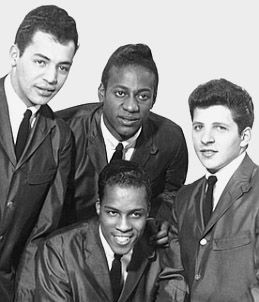
Over the next few years, Johnny continued making records using the Maestro name, beginning with "Before I Loved Her" on United Artists in the summer of '62. The Crests appeared on the Trans Atlas label around the same time with "The Actor" featuring James Ancrum's lead, then had brief regional success with "Guilty" on Selma Records in early '63. Neither came close to the original sound, nor did Johnny Maestro's first of two singles for Cameo, "Over the Weekend," with backing vocals by The Tymes. From '64 to '66, the Crests appeared on Coral and J.T. Carter had one release on sister label Decca. Johnny recorded "Phone Booth on the Highway" for Apt and had one single on Scepter and three more on Parkway as Johnny Maestro and the Crests, though none of those singers were original members of the group.
Johnny switched gears in 1966 when he became the lead vocalist for a group he'd known awhile, The Del-Satins (previously featured, usually without credit, on Dion's hits for Columbia Records). They toured together but never did any recording...at least not right away. Enter The Rhythm Method, a seven-piece band led by saxophonist Tom Sullivan with guitar, bass, organ, drums and horn players. Not everyone was sold on the feasibility of touring or recording with an eleven-member outfit; someone said it would be easier to sell the Brooklyn Bridge than a band of that size...and the joke became their name. They signed with Buddah Records, headed by Neil Bogart (of the recently-defunct Cameo-Parkway). The second single by Brooklyn Bridge (randomly billed with or without "the" in the name) was a runaway hit; hot songwriter Jim Webb's "Worst That Could Happen," a million seller in early 1969, was followed by "Blessed is the Rain," ""Welcome Me Love," "Your Husband - My Wife" and "You'll Never Walk Alone," all mid-charting '69 releases.
In the 1980s, J.T. Carter, who'd been producing records for several years, formed a new group that toured as the Crests for more than a decade. Johnny Maestro toured with various configurations of The Brooklyn Bridge for forty years, incorporating his solo songs and Crests hits, continuing until just before his passing in 2010. That first major hit, "16 Candles," had a resurgence in popularity after appearing on the soundtrack of George Lucas's classic 1973 throwback American Graffiti and again when it served as inspiration for 1984's Sixteen Candles, the first of several wildly popular teen comedy films by director John Hughes. Representing the optimistic essence of teenage romance, "16 Candles" by The Crests is one of the essential hits of the rock and roll era.
NOTABLE SINGLES:
- Sweetest One /
My Juanita - 1957 - No One to Love - 1957
- Pretty Little Angel - 1958
as the Crests with Johnny Mastro - 16 Candles - 1959
- Six Nights a Week - 1959
- Flower of Love - 1959
- The Angels Listened In - 1959
- A Year Ago Tonight - 1959
- Step by Step - 1960
- Say it Isn't So - 1960
by Johnny Masters - Trouble in Paradise - 1960
- Journey of Love - 1960
as the Crests featuring Johnny Mastro - Isn't it Amazing - 1960
as the Crests featuring Johnny Mastro - I Remember (In the Still of the Night) - 1960
as the Crests with Johnny Mastro - Model Girl - 1961
by Johnny Mastro the Voice of the Crests - What a Surprise - 1961
by Johnny Maestro the Voice of the Crests - Mr. Happiness - 1961
by Johnny Maestro with the Coeds - The Way You Look Tonight - 1961
by Johnny Maestro - Baby I Gotta Know - 1961
- Besame Baby - 1961
by Johnny Maestro - Before I Loved Her - 1962
by Johnny Maestro - Guilty - 1963
- Did I Remember - 1963
- Over the Weekend - 1963
by Johnny Maestro - (It's Harder To) Make Up My Mind - 1964
by Johnny Maestro - Phone Booth on the Highway - 1965
by Johnny Maestro - I'm Stepping Out of the Picture - 1965
as Johnny Maestro and the Crests - Heartburn - 1966
as Johnny Maestro with the Crests - Come See Me (I'm Your Man) - 1966
as Johnny Maestro and the Crests - My Time - 1966
as Johnny Maestro with the Crests - Little Red Boat by the River - 1968
by the Brooklyn Bridge - Worst That Could Happen - 1969
by Brooklyn Bridge - Blessed is the Rain - 1969
by the Brooklyn Bridge /
Welcome Me Love - 1969
by the Brooklyn Bridge - Your Husband - My Wife - 1969
by the Brooklyn Bridge - You'll Never Walk Alone - 1969
by the Brooklyn Bridge - Down by the River - 1970
by the Brooklyn Bridge - I Feel Free - 1972
by the Bridge


